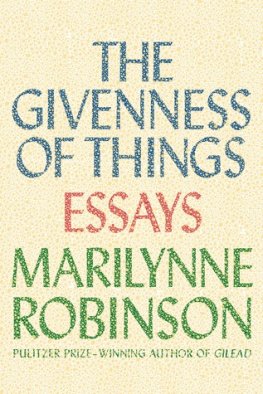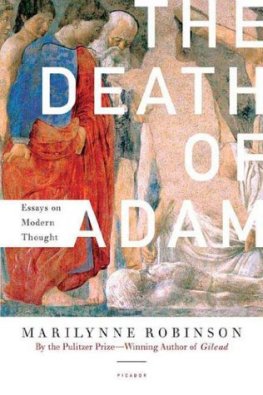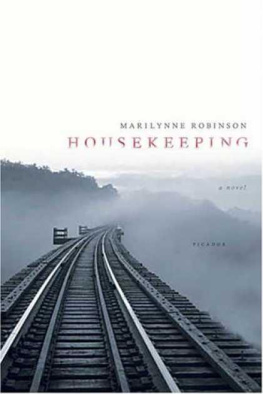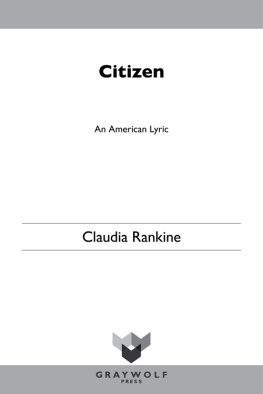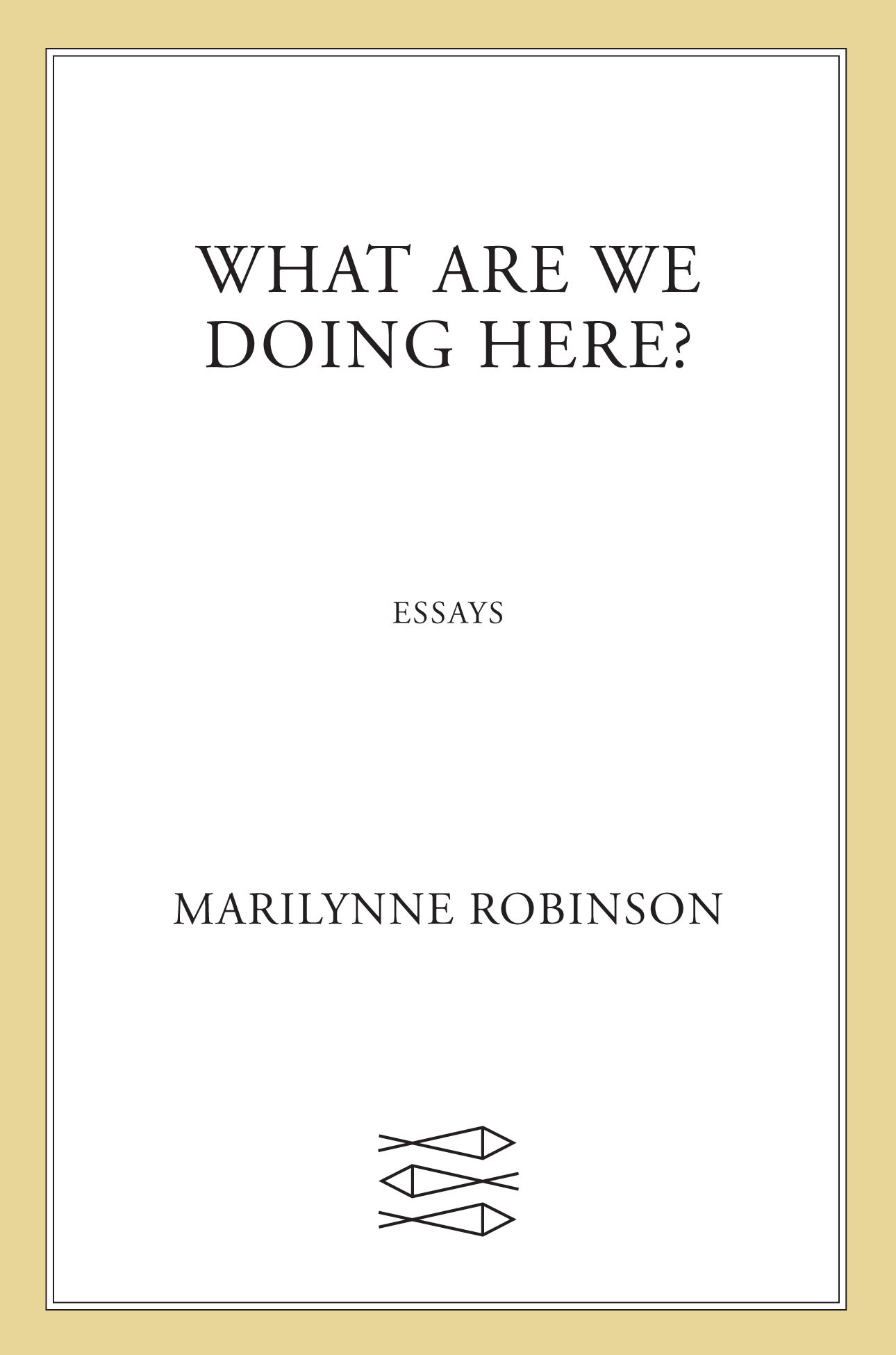Contents
Guide
Pagebreaks of the print version

The author and publisher have provided this e-book to you for your personal use only. You may not make this e-book publicly available in any way. Copyright infringement is against the law. If you believe the copy of this e-book you are reading infringes on the authors copyright, please notify the publisher at: us.macmillanusa.com/piracy.
James and Megan
Joseph and Katherine
Beatrice and Theodore
Nearest and Dearest
This book is a collection mostly of lectures I have given in churches, seminaries, and universities over the last few years. Most of them reflect central preoccupations that are to my mind matters of urgency and that arise from the way we think now. I know it is conventional to say we Americans are radically divided, polarized. But this is not more true than its oppositein essential ways we share false assumptions and flawed conclusions that are never effectively examined because they are indeed shared.
In great part this is the fault of our intellectual culture. It pains me to say this. These are people I identify with and have learned from and whom I wish I could admire wholeheartedly. The fact is, however, that much of what I have learned from them has amounted to my taking exception to a book or a lecture and then mulling over the reasons for my discontent with it. This is no doubt obvious from my earlier essays.
Here is an instance of the alarming like-mindedness that has emerged among us over the last few decades. Many teachers in the humanities have treated it as true that this country was always fundamentally capitalist, intending the word to mean more or less what they think Karl Marx intended by it. In 99.5 percent of cases they have never read a page of Marx, so they have no idea what he was describing. Capitalism in his time was largely the commerce between American cotton fields and British cotton factories, which generated great wealth on both sides, together with vast, nearly absolute poverty on both sides, among English workers and American slaves. It is true that slave labor was used in Northern states while they were under British law, which demonstrates that the use of it was economically viable there, too. Nevertheless, after the Revolution those states acted to ban it.
In the South cotton capitalism accelerated, inspiring dreams of Mexican and Central American conquest. The South was otherwise remarkably static. Little schooling or publishing went on there. It realized a fantasy of itself in a hastily contrived, clapped-together timeless order, the kind enjoyed by the moneyed in the Old World, many of whom bought their castles and furnished their chapels with profits from the slave trade. I have heard, more times than I can count, that capitalism was an American invention, and the basis of our exceptionalism. Supposedly it was the North that was capitalist, able to bully the pastoral South because the North was greedy and aggressive, and industrialized. Marx neither said nor implied any such thing, certainly not in his essays about the Civil War. As he was well aware, Southern slavery was part of an industrial workforce whose great center was in England. Its tactics of exploitation were in the last degree greedy and aggressive. The great vision of the South was the spread of slavery and cotton all the way to California. Anyone who bothered to read Jefferson Davis would be clear on this point.
This nonsense is important first of all because it legitimizes rapacious capitalism as preeminently American, the source of our success, including those freedoms we acknowledge. And it describes a national character formed around the values associated with it, a generalization that has important interpretive consequenceseverything that has happened in our history is to be understood in its essence as profit driven. Among liberals who subscribe to this notion, which they all do, since they tend to feel that we as a nation are gravely deficient in humility, this produces a slick, unreflecting cynicism. Among those whom we call conservatives, it produces an unembarrassed enthusiasm for self-interest, so long as the interest in question is their own. It encourages the kind of brutalist heroics celebrated in the pages of Ayn Rand. On left and right, such thinking makes the enlightened, humane development of American culture over centuries inauthentic. It is shocking how defenseless the protections of the environment, of the poor, and even of the rights of voters have been shown to be in recent years. No one defends these things as American, because the Left no more than the Right thinks of them as among our core values. The great engine of capitalism can mow them down, since they were derivative at best and in any case are proved to be inessential by the very fact that they are vulnerable and exceptional. Self-interest, on the other hand, is universal and constantand was presumably the motive behind these institutions in the first place. True, it can take some tortuous reasoning to account for their original economic utility. But if a conclusion can be assumed to be true, there is no need to worry about arriving at it by means that might otherwise seem dubious.
The Left does not understand the thinking of the Right because it is standing too close to have a clear view of it. In important respects, the Left has nurtured and rationalized it, neglecting and distorting history in the process, therefore removing potential correctives. It is easy to tell a roomful of eighteen-year-olds that given time the efficiencies of capitalist free labor would have eliminated slavery. So the Invisible Hand would have been the real liberator, if the idealists had simply stepped back and let it do its work. Presumably this is the kind of thing President Donald J. Trump had in mind when he said the Civil War could and should have been avoided. He might have learned this from the Far Right, but it could equally well have come to him from more respectable sources. Again, nothing in the thinking or in the aspirations of Jefferson Davis suggests that he foresaw anything less than a vast expansion of slavery throughout the Americas. An unbridled South would have brought catastrophe far beyond our borders. Dare I mention the Mexican War? We can assume that abolitionists were nave in failing to leave history in the ungentle hands of economic forces, or that they had mercenary interests greater than accommodation with the vast wealth generated by slavery. Or we can assume that they listened to the voices of the South and learned from them how very much was at stake. But why bother with context? Still, even after very many years, it sounds bold and provocative to flatten the historical landscape and to deal in moral equivalencies.
* * *
We have surrendered thought to ideology. Every question is for all purposes the same question, every answer the same answer. Why has anyone done anything? Self-interest. This is true of the whole species, but it is most emphatically true of Americans. Where in all this is wisdom, courage, generosity, personal dignity? To think in such terms is nave. These qualities are merely apparent, never determinant. To say that we as a national community have benefited from them, that individuals have actually considered the general welfare from time to time and addressed it, acted in light of it, is to slide into shameless nationalism. The Right is more than happy to be excused from these ideals, standards that have, historically, been invoked in order to mitigate the uglier impulses, greed prominent among them. The Left cannot account for the civic virtues in theoretical or ideological terms and feels awkward speaking of them in religious terms. This is only truer because the Right has made religious language toxic by putting it to uses that offend generosity and dignity. Perhaps the worst thing about ideological thinking is that it implies a structure in and behind events, a history that is reiterative, with variations that cannot ultimately change the course of things and are therefore always trivial, no matter how much thought and labor goes into the making of them. The notion of an abiding sameness despite superficial differences can have consequences that are hilarious and awful, as when a roomful of professors, flown in from the corners of the world to share their thoughts, in all seriousness identify as wage slaves because they are dependent on their earnings. The other side of this is the permission given by the concept of class war to people on the right who consider themselves successful, therefore embattled. They can resist arguments for economic justice as if they were existential threats, the grumblings of resentment that, if acted on, would loot them of their trophies. In this country, at least, it is more temperament than circumstance that leads people to identify themselves with one side or the other. Meanwhile, actual American workers have no place in the conversation. If they identify with it at all, it is in their refusing to think of themselves as an exploited class, and in their readiness to identify with success and power. This is entirely understandable given the alternative, and given the memory, recent for many of them, of times when they could count on fairly compensated work, with everything this implies for personal latitude and social mobility.


